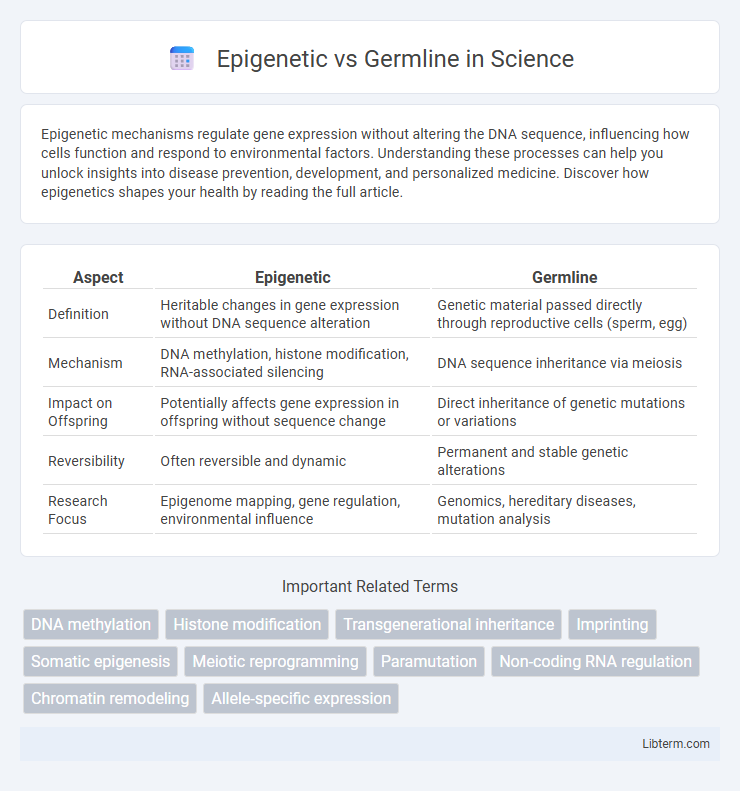Epigenetic mechanisms regulate gene expression without altering the DNA sequence, influencing how cells function and respond to environmental factors. Understanding these processes can help you unlock insights into disease prevention, development, and personalized medicine. Discover how epigenetics shapes your health by reading the full article.
Table of Comparison
| Aspect | Epigenetic | Germline |
|---|---|---|
| Definition | Heritable changes in gene expression without DNA sequence alteration | Genetic material passed directly through reproductive cells (sperm, egg) |
| Mechanism | DNA methylation, histone modification, RNA-associated silencing | DNA sequence inheritance via meiosis |
| Impact on Offspring | Potentially affects gene expression in offspring without sequence change | Direct inheritance of genetic mutations or variations |
| Reversibility | Often reversible and dynamic | Permanent and stable genetic alterations |
| Research Focus | Epigenome mapping, gene regulation, environmental influence | Genomics, hereditary diseases, mutation analysis |
Introduction to Epigenetics and Germline
Epigenetics studies heritable changes in gene expression without altering the DNA sequence, involving mechanisms like DNA methylation, histone modification, and non-coding RNA regulation. Germline refers to cells that give rise to gametes, transmitting genetic and epigenetic information to offspring, essential for heredity and developmental programming. Understanding epigenetic modifications in germline cells is crucial for elucidating how environmental factors influence inherited traits and disease risk.
Defining Epigenetic Mechanisms
Epigenetic mechanisms involve modifications such as DNA methylation, histone modification, and non-coding RNA regulation that alter gene expression without changing the underlying DNA sequence. These changes can be influenced by environmental factors and may be reversible, impacting cellular function and phenotype across an individual's lifespan. Unlike germline mutations, which are heritable genetic changes passed through reproductive cells, epigenetic modifications can occur in somatic cells and do not directly alter the genetic code.
Understanding Germline Inheritance
Germline inheritance involves the transmission of genetic information through reproductive cells, ensuring traits and mutations are passed to offspring, while epigenetic changes refer to heritable modifications that affect gene expression without altering the DNA sequence. Understanding germline inheritance is crucial for studying how genetic traits and hereditary diseases propagate across generations, influenced by both genetic mutations and epigenetic markers. Research in germline epigenetics reveals mechanisms by which environmental factors can induce heritable phenotypic variations, highlighting the dynamic interplay between stable DNA sequences and reversible gene regulation processes.
Key Differences Between Epigenetic and Germline Changes
Epigenetic changes involve reversible modifications to DNA or histones that regulate gene expression without altering the nucleotide sequence, while germline changes refer to permanent genetic mutations passed from parents to offspring through reproductive cells. Epigenetic modifications, such as DNA methylation and histone acetylation, can be influenced by environmental factors and do not alter the DNA sequence, contrasting with germline mutations that directly change the genetic code in sperm or eggs. Germline changes have lasting hereditary effects across generations, whereas epigenetic changes primarily affect gene regulation within an individual's lifetime and may or may not be inherited.
Molecular Basis of Epigenetic Modifications
Epigenetic modifications involve molecular changes such as DNA methylation, histone modification, and non-coding RNA activity that regulate gene expression without altering the DNA sequence. These modifications are reversible and can be influenced by environmental factors, differing from germline mutations which are permanent changes in the DNA sequence passed to offspring. The molecular basis of epigenetic regulation centers on chromatin remodeling and chemical tags influencing transcriptional activity, enabling dynamic control of gene expression across cell generations.
Heritability: Epigenetic vs Germline Mutations
Epigenetic modifications involve reversible changes to gene expression without altering the DNA sequence, and while some epigenetic marks can be inherited across a few generations, their heritability is often transient and influenced by environmental factors. Germline mutations are permanent changes in the DNA sequence of reproductive cells, ensuring stable transmission of genetic information from parents to offspring across multiple generations. The key difference in heritability lies in the persistence and stability of germline mutations versus the typically reversible and environment-sensitive nature of epigenetic marks.
Role in Evolution and Development
Epigenetic modifications influence gene expression without altering the DNA sequence, playing a crucial role in development by regulating cellular differentiation and enabling phenotypic plasticity. Germline mutations alter the DNA sequence and are heritable, contributing to evolutionary processes by introducing genetic variation across generations. Epigenetic changes can be reversible and environmentally responsive, whereas germline variations provide a stable substrate for natural selection to act upon.
Implications for Human Health and Disease
Epigenetic modifications influence gene expression without altering the DNA sequence, affecting cell function and potentially contributing to diseases like cancer, diabetes, and neurological disorders. Germline mutations, inherited through reproductive cells, directly alter DNA sequences, causing hereditary conditions such as cystic fibrosis, Huntington's disease, and certain cancers. Understanding the distinct roles of epigenetic changes and germline mutations is crucial for developing targeted therapies and precision medicine approaches in human health.
Recent Advances in Epigenetic and Germline Research
Recent advances in epigenetic research have uncovered intricate mechanisms regulating gene expression without altering DNA sequences, emphasizing DNA methylation, histone modification, and non-coding RNA roles. Germline studies have progressed with improved genome editing techniques like CRISPR, enabling precise manipulation of hereditary genetic material to investigate mutation effects and inheritance patterns. Integrative approaches combining epigenomic profiling and germline genome analysis accelerate understanding of transgenerational epigenetic inheritance and its implications for human health and disease.
Future Perspectives and Ethical Considerations
Emerging research in epigenetics and germline modification highlights transformative potential for disease prevention and human health enhancement, with gene editing technologies like CRISPR driving advances in heritable trait alteration. Ethical considerations center on the ramifications of germline interventions, including long-term effects on genetic diversity, consent challenges across generations, and the risk of exacerbating social inequalities. Future perspectives emphasize the necessity of robust regulatory frameworks, transparent public discourse, and equitable access to ensure responsible application of these powerful biotechnologies.
Epigenetic Infographic

 libterm.com
libterm.com